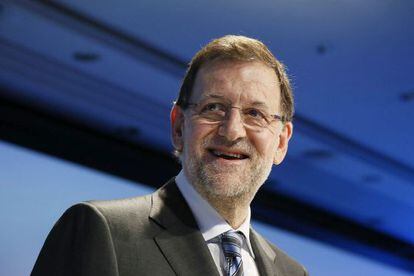PM confident over new job and social security figures
Rajoy promises at annual economic conference to drop income taxes in 2015


Prime Minister Mariano Rajoy on Saturday tried to assure a group of economists and businessmen gathered for an annual economic congress in Sitges that the "worst is over."
The Popular Party (PP) leader reminded attendees during the yearly Economic Circle at the Barcelona beach resort town that in 2012 he told the same gathering that Spain was not going to need a bailout. "We have taken painful decisions, which have been unavoidable. Our efforts have borne fruit; the worst is over," Rajoy said.
The basis for this optimism are upcoming figures that he described as "very encouraging," concerning the new unemployment percentages and the number of people who registered with the Social Security system last month.
"I'm not counting chickens here, however I recommend that you pay attention to unemployment and social security numbers on Tuesday. [...] If the patterns we've seen are confirmed they will be clearly encouraging," Rajoy said.
"I'm not counting chickens here; I recommend you pay attention to unemployment and social security numbers on Tuesday"
For the past several weeks, government sources have said that May was one of the best months for drops in the jobless rate — which at the end of March stood at 27.2 percent, reflecting that some 6.2 million Spaniards are out of work.
Last week, the Paris-based Organisation for Economic Co-operation and Development (OECD) predicted that unemployment will rise to more than 28 percent this year before stabilizing. Spain's painful jobless state is partly due to the prolonged contraction, which has depressed consumption and frozen hiring, the OECD said in its report.
Along with Rajoy's positive outlook, the prime minister said that his government has no plans to raise value added tax (VAT), and assured conference-goers that Brussels has never demanded Spain raise the rate, which stands at 21 percent for most items and purchases.
In reality, the European Commission had asked Spain to raise VAT on more products that currently fall under a special rate category, but the Rajoy administration has declined because it fears it could affect Spain's tourism, hotel, and food and beverage industries. "Portugal has VAT of 23 percent for its restaurants and hotels — ours is at 10 percent. Our priority was to avoid a bailout because if not we would be in the same position as Portugal," Rajoy said.
At last year's Sitges conference, Rajoy said he had no intentions of raising VAT but actually went against his words a month later and hiked it to 21 percent from 18 percent.
But this year, the prime minister insisted that his center-right government hopes to lower taxes as soon as possible and would cut income tax by 2015.
"It's not right to feed people's fears and be swept along by irrational thinking. We aren't on the edge of a cliff; this isn't the eve of the apocalypse. There's some turbulence but we can bear it and overcome it successfully," he said.
We aren’t on the edge of a cliff; this isn’t the eve of the apocalypse"
Rajoy reiterated his calls for Europe to do more to move quickly toward a fiscal and political union, which he said is needed to calm financial markets and guarantee the future of the euro. "We aren't growing because Europe isn't growing," he said.
One subject Rajoy avoided completely was the corruption charges facing the PP, even though some conference-goers asked about the "demoralization of society" because of the political situation.
"It is true that corruption issues appear in the newspapers, but it is profoundly unfair to generalize and place all politicians under suspicion," Rajoy said.










































